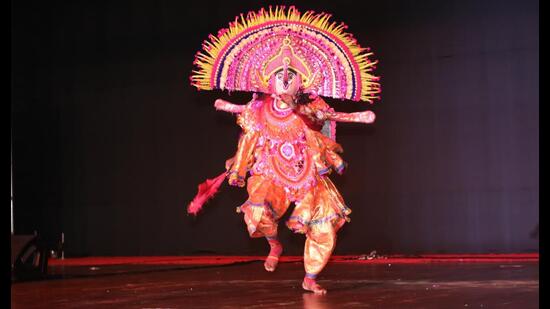
REPORT: THE 9TH INTERNATIONAL CONVENTION OF SPIC MACAY
“You will see deer, jackals, birds, butterflies, monkeys, and also students and professors in this lush green campus of IIT Madras,” remarked V Kamkoti, Director, IIT Madras, welcoming the nearly 1,500 students and teachers from across the country and abroad participating in the 9th International Convention of SPIC MACAY (Society for Promotion of Indian Music and Culture Amongst Youth) held from May 20 to 26.
SPIC MACAY’s annual convention comprises programmes of Indian classical music and dance, folk arts and crafts, meditation, yoga, cinema screenings, talks and workshops conducted by expert practitioners from different fields, and heritage walks too, among other intellectually stimulating events.
This year’s venue, the verdant IITM, was transformed into an ashram with the Brahm muhurt at 4am followed by the practice of hatha-yoga, naad-yoga, saadhana, Gurbani, Baul gaan and Kudiyattam. Participants then had a holistic breakfast of sattvik bhojan.
At the week-long event, the first half of each day offered intensive workshops in classical music and dance, folk arts and crafts, theatre, and puppetry. If the sattik food nourished the body, the cultural programmes and the gurukul-like atmosphere where young students lived in close proximity with gurus enriched minds. While the classical Hindustani dhrupad intensive programme under Ustad Wasifuddin Dagar brought out the genre’s meditative quality, Ustad Raja Miyan, himself a representative of the Agra Gharana, introduced students to the khayal form and to the different gharanas of Hindustani khayal gayaki. Guru Shanta and VP Dhananjayan taught the basics of Bharatanatyam, guru N Shailaja did the same for Kuchipudi, as did Sunayana Hazarilal for Kathak. Odissi guru Madhavi Mudgal taught students about the Chauka and Tribhanga, the basic stance of Odissi, to a repertoire starting with Mangalacharan.
That was not all. Vidwan Malladi Suri Babu taught Carnatic vocal, Alankar Singh taught Gurbani, Khumukcham Romendro Singh taught Pung Cholam and Sudip Sen taught puppetry. Hath-yoga enthusiasts were guided by Swami Tejomayananda and Brahmkumari Manisha eased students into meditation.
The visual arts and crafts workshops had experts sharing their deep knowledge of their specialisations. Ashok Kumar Vishvas taught Tikuli Kala from Bihar, Shakir Khan taught Mughal miniature painting, Bhajju Singh Shyam taught Gong Chitra-Kala, and Hemchandra from Majuli, Assam, taught mask making.
Afternoon sessions included screenings of classic films followed by discussions. There were also a variety of performances including Kabir Gaayan by Kaluram Bamania, Puruliya Chhau by Tarapad Rajak and troupe and Baul Gaan by Parwati Baul. Theatre offerings included Dharmaveer Bharati’s Kanu-Priya directed by Ratan Thiyam and Habib Tanveer’s Charanadas Chor by Naya Theatre. There were also musical performances of Gurbani by Alankar Singh, qawwali by Nizami Brothers and Pung Cholam by Khomukhum Ramendro Singh and his troupe from Assam.
The evening concerts of classical music and dance were excellent too with the participation of luminaries like Bharata natyam exponent Padma Subrahmanyam, flautist Pandit Hari Prasad Chaurasia, Kathak dancer Sunayana Hazarilal, Carnatic violinists Vidushi Kanya Kumari and GJR Krishnan, Hindustanti vocalists Pandit Ulhas Kashalkar and Pandit Venkatesh Kumar, Carnatic vocalist Neyveli Santhangopalan, sitar maestro Ustad Shahid Parvez and Jayanthi Kumaresh Saraswathi on the veena. And these were just some of the stalwarts.
The grand event ended with a dusk to dawn concert that opened with the sonorous sarod of Ustad Amjad Ali Khan, followed by Carnatic vocals by Vidushi Sudha Raghunathan and Hindustani vocals by Vidushi Ashwini Bhide. Next came Kalyan Saugandhikam in Kudiyattam, a living tradition of Sanskrit plays, which has been recognised as the oldest form of intangible heritage by the UNESCO. It was presented by Shri Margi Madhu and his Nepathya repertory. The Intercon concluded with a serene Dhrupad recital by Ustad Wasifuddin Dagar.
This year’s event genuinely felt like a Mahakumbh of culture with enthusiasts young and old being given the chance to experience the vibrance of Indian art and culture, heritage and ethics.
Manjari Sinha is a senior music critic.
Read more news like this on HindustanTimes.com
2024-07-05T12:08:07Z dg43tfdfdgfd